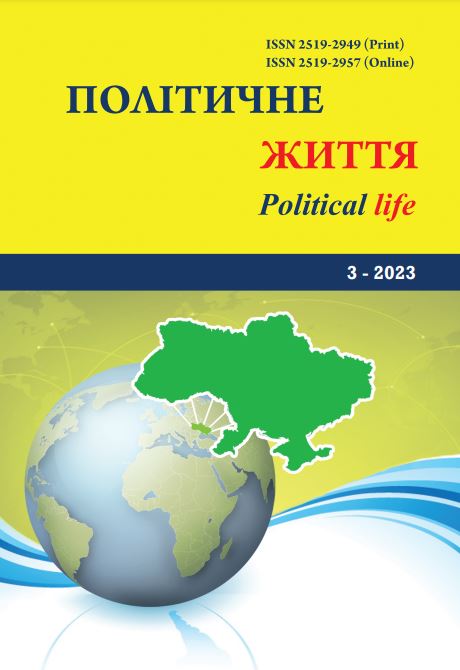Theoretical principles of modeling public and political processes
DOI:
https://doi.org/10.31558/2519-2949.2023.3.4Keywords:
modeling; public policy research methodology; public policy models; public policy sphere; analogy; theory.Abstract
The purpose of this article is to analyze the theoretical foundations of modeling as a scientific method, which is considered as a promising tool for researching public policy processes.
It has been proven that modeling is a broader concept than building models. This concept includes conclusions by analogy as its integral part. Actually, the analogy implies the relationship between the model already given in one way or another and the original, which comes from the political environment, and the result of the study of the model in this case is assumed to be known. It is noted that the concept of the modeling method also includes the very process of building a model or finding it in nature. An important stage in the application of the modeling method is the study of the built model, obtaining the necessary information with its help and, finally, transferring the conclusions regarding the model to the original.
It was determined that during the construction, further research of the model and the transfer of the conclusions obtained regarding the model to its original, they rely on the above-described analogy procedures and proceed from the degree of conformity of the model to object modeling. Usually, in the form of models, objects that are equivalent to the original in the relations that interest us, in whole or in part, are used. In the first case, we are talking about isomorphic models, in the second - about homomorphic models. In the case of homomorphic mapping, the purpose of modeling is to implement one or another way of mapping the space of states (parameters or properties) of the object under study to another, in the accepted sense, similar space of smaller dimensions. It is noted that the processes of simplification of the original within the limits allowed by the conditions of the study are of a general nature.
It is concluded that there remain many issues for further research, among which the problems of typology, comparative adequacy and effectiveness of models intended for researching different types of public policy processes are highlighted.
References
Баранов Г.С. Модели и метафоры в социологии К. Маркса / Г.С. Баранов // Социологические исследования. — 1992. — № 6. — С. 128–142.
Бойко-Бойчук Л. Метод аналогій у соціально-політичних дослідженнях / Л.Бойко-Бойчук // Політичний менеджмент — 2007. — № 4. — С. 74-82.
Бурбаки Н.. Очерки по истории математики / Н. Бурбаки. – М.: Иностранная литература, 1963.
Вартофский М. Модели. Репрезентация и научное понимание / М.Вартофский. – М.: Прогресс, 1988. – 506 с.
Гансова Е. А. Сучасна соціальна та гуманітарна політика в контексті соціологічної науки : навчальний посібник / Е.А.Гансова. – Одеса, 2000. – 72 с.
Гемпель К. Г. Логика объяснения / К.Г.Гемпель. – М.: Дом интеллектуальной книги, Русское феноменологическое общество, 1998. — 240 с.
Кондаков Н.И. Логический словарь-справочник / Н.И.Кондаков. Отв. ред. Д.П.Горский. – М.: Наука, 1975. – 720 с.
Мангейм Дж. Б., Рич Р. К. Политология. Методы исследования : Пер. с англ. / Дж.Б.Мангейм, Р.К.Рич. Предисл. А.К. Соколова. – М.: Издательство “Весь Мир”, 1997. – 544 с.
Моисеев Н.Н. Математика в социальных науках / Н.Н.Моисеев // Математические методы в социологическом исследовании. – М., 1981. – С.10 – 24.
Новик И. В. Гносеологическая характеристика кибернетических моделей / И.В. Новик // Вопросы философии. – 1963. – № 8.
Пащенко Ф.Ф. Введение в состоятельные методы моделирования систем : в 2-х ч. / Ф.Ф.Пащенко. – М.: Финансы и статистика, 2006. – Ч.1: Математические основы моделирования систем. – 328 с.
Плотинский Ю.М. Модели социальных процессов : 2-е изд., перераб. и доп. / Ю.М.Плотинский. – М.: Логос, 2001. – 296 с.
Прангишвили И.В. Системные законы и закономерности в электродинамике, природе и обществе / И.В. Прангишвили, Ф.Ф. Пащенко, Б.П. Бусыгин. - М.: Наука, 2001.
Современная философия науки. – М.: Логос, 1996. – 400 с.
Уемов А. И. Аналогия в практике научного исследования / А.И.Уемов. – М.: Наука, 1970. – 264 c.
Философский энциклопедический словарь : 2-е изд. – М.: Советская энциклопедия, 1989. – 816 с.
Фролов И. Т. Гносеологические проблемы моделирования биологических систем / И.Т.Фролов //Вопросы философии. – 1961. – № 2.
Штофф В.А. Моделирование и философия / В.А.Штофф. –Л.: Наука, 1966. – 302 с.
Эйкхофф П. Основы идентификации систем управления / П.Эйкхофф. -М.: Мир, 1975.
Brown R.H. Social theory as metaphor – logic of discovery for sciences of conduct / R.H.Brown // Theory and Society. – 1976. – Vol. 3. – № 2. – P. 169 – 197.
Easton D. A Systems Analysis of Political Life / D.A.Easton. – New York: Wiley, 1965.
Isaak A.C. Scope and methods of political science / Alan C. Isaak : rev. ed. Homewood, IL: Dorsey Press, 1975.
Plank М. Positivismus and reale aussenwelt / M.Plank. akad. Verlag, 1931.
Sоrоkin P.А. Sociological Theories of Today / P.А.Sоrоkin. New York; London: Harper and How. 1966. – 676 p.

